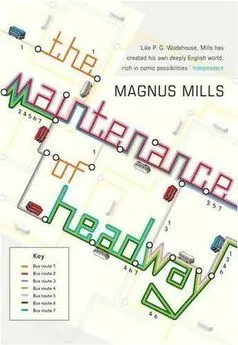Magnus Mills - The Maintenance of Headway
- Название:The Maintenance of Headway
- Автор:
- Жанр:
- Издательство:Bloomsbury UK
- Год:2009
- ISBN:нет данных
- Рейтинг:
- Избранное:Добавить в избранное
-
Отзывы:
-
Ваша оценка:
Magnus Mills - The Maintenance of Headway краткое содержание
It's a matter of procedure,' I explained. 'Strictly for the record. You don't get sacked from this job unless you did what Thompson did.' 'What did he do then?' 'We never mention it.' In Magnus Mills' brilliant short novel he transports us into the bizarre world of the bus drivers who take us to work, to the supermarket, to the match and home again. It is a strange but all too real universe in which 'the timetable' and 'maintenance of headway' are sacred, but where the routes can change with the click of an inspector's fingers and the helpless passengers are secondary. The journey from the southern outpost to the arch, the circus and the cross will seem as familiar as your regular route, but then Magnus Mills shows you the almost religious fervour which lies behind it, and how it is fine to be a little bit late but utterly unforgivable to be a moment early. 'To write one unique book is a rare achievement. The ability to produce several is truly special.' Independent
The Maintenance of Headway - читать онлайн бесплатно полную версию (весь текст целиком)
Интервал:
Закладка:
“What happened to these graduates?” I asked at length.
“They spent many months working towards their piece de resistance,” said Edward. “By now they’d decided they needed to be more ambitious, so they looked for a slogan that was all-encompassing. Eventually they found it, but then they went and overreached themselves.”
“How?”
“They presented it to the Board in Latin.”
“You’re joking.”
“I’m not,” said Edward. “‘ Itineris omnibus .’ It means ‘journeys for everyone’, apparently.”
“Omnibus?” said Davy. “But that takes us back to where we started.”
“Quite.”
“I bet they thought they were being frightfully clever,” I remarked.
“Oh, frightfully,” said Edward. “They even produced a special poster. All pastel colours and swirling shapes. Needless to say the Board of Transport didn’t like it at all.”
“I’m not surprised.”
“The public, meanwhile, were completely baffled. It spelt the beginning of the end for the graduates. Oh, they hung around for a short while, but one by one they started to drift away.”
“Except for Woodhouse.”
“Yes,” said Edward. “Woodhouse is still with us. Passes his time churning out pie charts and so forth while he continues his search for that elusive slogan. I’ve heard he’s currently seeking a rhyme for ‘the maintenance of headway’.”
Five
Somewhere on the road ahead of me was another bus. I couldn’t see it, but I knew it was definitely there. In fact, I could almost sense its presence. By my estimate it was about two stops away, on the far side of the bridge, heading for the common, and approximately two minutes late. I was close behind; but not too close. I had four minutes in hand, the bus stops were deserted and the sun was shining. In other words, conditions were perfect for practising the art of running early. As I passed slowly over the bridge I took advantage of the majestic view: the long curve of the river as it disappeared into the shimmering east; the tower cranes waiting patiently amongst half-finished buildings; and the distant public clocks, all showing different times of day. How many journeys had I made over this bridge? I once calculated it was roughly a thousand trips a year. Each way, of course. I knew every inch of this road. Every traffic light and every bump. When you came to the southern approach there was a slight dip which caused the bus to bounce dramatically if it was travelling at any speed over twenty miles per hour. Quite good fun if you were chock-a-block with people during the evening rush. This morning, however, I was taking it easy. I’d been out here since five past five and now I was making my way back to the garage for breakfast. With time on my side I could be the ‘artist at work’ for the next quarter of an hour or so. These buses were designed for heavy loadings, and consequently when they were empty they had a certain lightness of touch, allowing them to move from one stop to the next as gracefully as a winged insect moving from flower to flower in a garden. I wasn’t completely empty, but to my mind less than half a dozen people counted as empty. When anybody rang the bell I treated them to a precision landing, pulling squarely into the kerb, and letting them out through the front doors to make them feel privileged. Just after the bridge was my favourite stop on the entire route. It stood at a point where the road’s camber was quite steep, so that the bus leaned towards the pavement in a friendly way, its roof gently brushing the leaves of an overhanging tree.
Oh, how I liked these early morning duties! There were five such duties on our rota and I did them whenever I had the chance. They all followed an identical pattern: you went from the garage down to the southern outpost, then up to the cross, back down to the outpost, up to the cross again, then back to the garage for breakfast. The third and fourth trips were the busiest because they took place at the height of the morning rush. After breakfast you just went from the garage to the cross and back, and that was the finish of your day’s work!
There was a cadre of drivers who specialised in these dawn (and pre-dawn) starts, their only qualification being the ability to rise from their beds, fully awake, at five o’clock, or four-thirty, or even four in the morning (depending on which particular duty it was). The bus company appreciated these drivers (although it would never admit the fact) and counted on them to provide a reliable service. For this reason the officials did their best to make sure all drivers got back in good time for breakfast. Today, for example, I knew Hastings was on the common keeping an eye on us. I’d seen him standing there on my northbound journey and he’d given me a nod. I also knew he wouldn’t be unduly bothered if I was four minutes early. Just so long as I kept well clear of my leader.
Actually, the whole process was self-regulating. I was scheduled to hand my bus over to the next driver with passengers on board, so I needed to arrive at the garage exactly on time. I now had a total of ten minutes in which to cover the final two miles. The ordained time for the journey was six minutes. The four spare minutes, therefore, were to be dispensed with as appropriate. Between the common and the garage there were eight bus stops, two zebra crossings and five sets of traffic lights, all of which had to be allowed for as I continued my progression towards the south. The former custom of pulling up at empty stops had long since fallen into disuse, but then again it provided a useful expedient when a bus needed to pause for the odd minute. The trick was never to delay too long at any one place. The few people on board needed to feel that the bus was moving, even if only very slowly; otherwise they would begin to protest.
As I trundled on I thought back to the halcyon days when I worked with Jumo on a VPB. Jumo’s sense of timing was second to none: he was easily the best conductor at the garage. On our first trip to the cross he would make sure we arrived five minutes early, and while I took the bus round to the stand I would watch in my mirror as he leapt from the platform and headed for the café. By the time I’d parked he would have returned with the requisite tea and custard doughnuts, for which he always refused payment. Then on the southbound journey he would control our speed through judicious use of the bell. There was many a day when I glanced back to see him standing on the edge of the platform, the wind ruffling his hair as we crossed the bridge, his hand poised in readiness over the button. One ring of the bell meant stop and wait a minute; two rings meant carry on. Jumo was very much at peace with the world: he never complained, even on the rare occasions when our bus was full of people!
Gunter was another good conductor, although I remember there was one episode when we seriously mistimed the return journey. We arrived at the common with twelve minutes in hand. Fortunately there was no inspector present, or we’d certainly have been ticked off. Even so, we were still faced with the problem of being far too early. We had to lose twelve minutes before we handed the bus over to the next crew, and as we hesitated at the common our people started to become restless. Gunter normally ruled his bus with a rod of iron, but today even he was having difficulty keeping them in check. After a few very long pauses at deserted bus stops we eventually resorted to our emergency plan. Gunter gave me two double bells (the agreed signal) and I pulled up beside a service station. I walked round the front of the bus and raised the bonnet. Gunter came and joined me, and for half a minute we stood gazing with concern at the whirring engine. In full view of our passengers we held an animated discussion. Then Gunter went into the service station and borrowed a bucket of water, which he emptied over the engine casing. Moments later we were engulfed in clouds of steam; we each gave a satisfactory nod, I closed the bonnet and Gunter returned the bucket. Finally we got back into the bus and set off again. The whole performance had taken about six minutes. Gunter told the people we’d been overheating and naturally they believed him. We reached the garage just two minutes early, which was quite acceptable.
Nowadays, of course, drivers operated buses on their own and had to make decisions for themselves.
I looked at my watch: four minutes to go, two more bus stops. A slight pause at each one: nothing too obvious. As I neared the last set of traffic lights they turned conveniently red, allowing me to arrive at the garage exactly one minute early. Then I handed over to the next driver and went in for my breakfast. As I said: the artist at work.
§
Upstairs in the canteen, I joined Jeff and Davy at their table. Jeff was despondent.
“Your friend booked me this morning,” he announced.
“What friend?” I asked.
“Mick Wilson.”
“Ah, well,” I said. “He was a friend once. I’m not so sure now though. What did he book you for?”
“Failure to maintain headway.”
“The standard felony,” remarked Davy.
“Where was this?”
“Southern outpost,” said Jeff. “He’s been stationed there all week.”
“I never noticed him,” I said. “Mind you, I was down there quite early. Probably before he started work.”
“Yeah, probably.”
“Fancy him booking you,” said Davy. “How could he do that when we all used to sit round this table together?”
“It’s the job, isn’t it?” I said. “I suppose he had to find a scapegoat to justify his existence. Unavoidable really.”
“I’m not a scapegoat,” Jeff replied. “He’s also booked Cedric, Roberto, Carlos, Fitzroy, Kenny, Stevie, Coleen, Jakki, Imran, Ibrahim and both Moseses.”
“Blimey.”
“It’ll be us next,” said Davy.
“Surely not.”
“Surely nothing,” he said. “It’s obvious the power’s gone straight to Mick’s head.”
“It was my first booking,” said Jeff.
“Well, I wouldn’t worry about it,” I said. “You’re hardly going to get the sack for a first offence. In fact, you can be booked repeatedly and nothing happens.”
“Really?”
“Yep.”
“Why do they bother booking us then?”
“It’s a matter of procedure,” I explained. “Strictly for the record. You don’t get sacked from this job unless you do what Thompson did.”
“What did he do then?”
“We never mention it.”
“Thompson?” said Davy. “I don’t remember him.”
“Yes, you do.”
“I’d remember if someone got the sack.”
“You do remember, but you’ve forgotten.”
“Thompson?”
“Yes,” I said. “He was one of those blokes who stays in the job about a year and then leaves again.”
“Well, there’s been hundreds of them.”
“Except he got the sack instead.”
“Thompson?” Davy repeated the name as he tried to conjure up a face. “Who did he go round with?”
“Us sometimes,” I replied. “Lots of people actually. You know that bloke who was always trying to fix the television?”
“No.”
“Yes, you do,” I said. “Kept putting his feet on the chair. Fitzroy had a big row with him about it.”
“Oh, him,” said Davy. “That’s right. He left about six months ago.”
“Well, he started on the same day as Thompson.”
“That’s a big help.”
“Sorry.”
“Who was his conductor?”
“Sedgefield.”
“I don’t remember him either.”
“Yes, you do.”
Читать дальшеИнтервал:
Закладка:





![Джеймс Купер - Пионеры, или У истоков Саскуиханны [The Pioneers, or The sources of the Susquehannah]](/books/1066142/dzhejms-kuper-pionery-ili-u-istokov-saskuihanny-t.webp)




